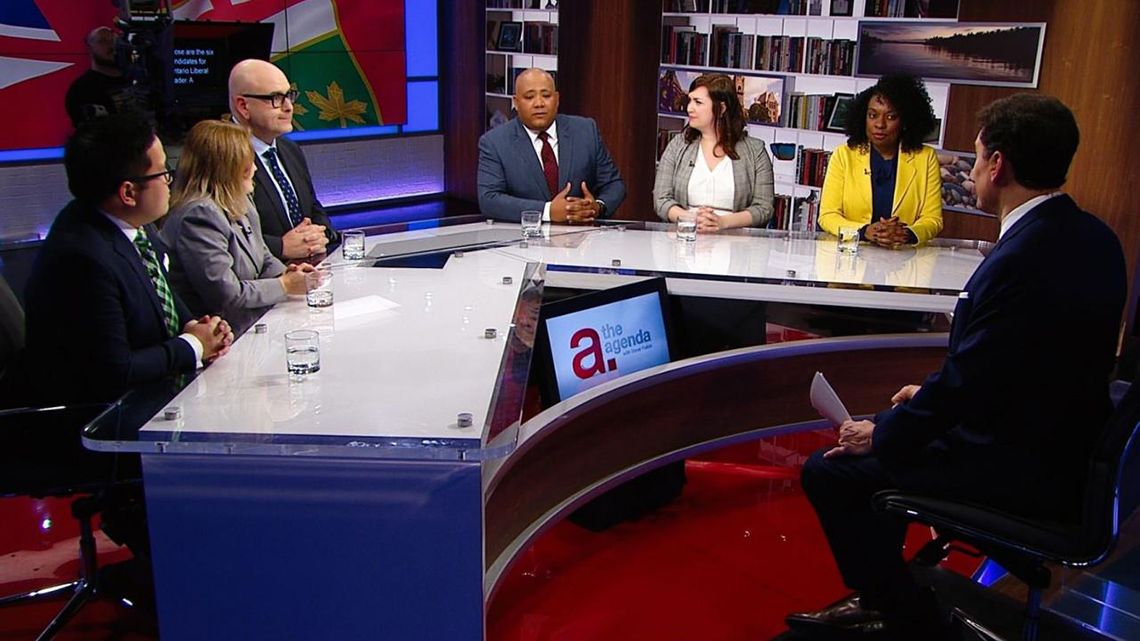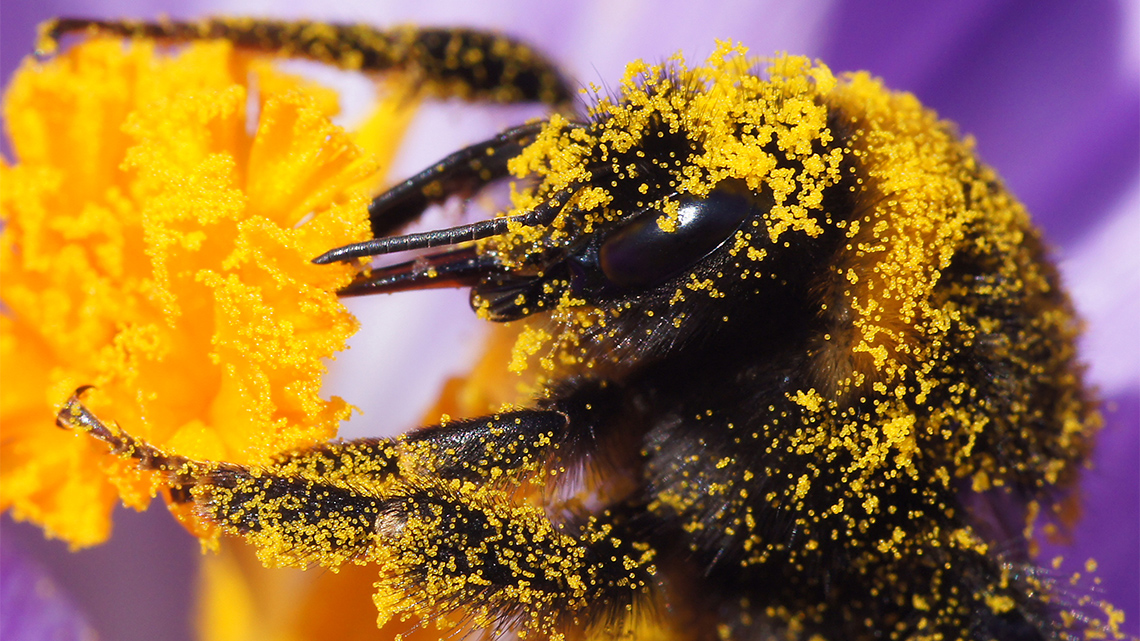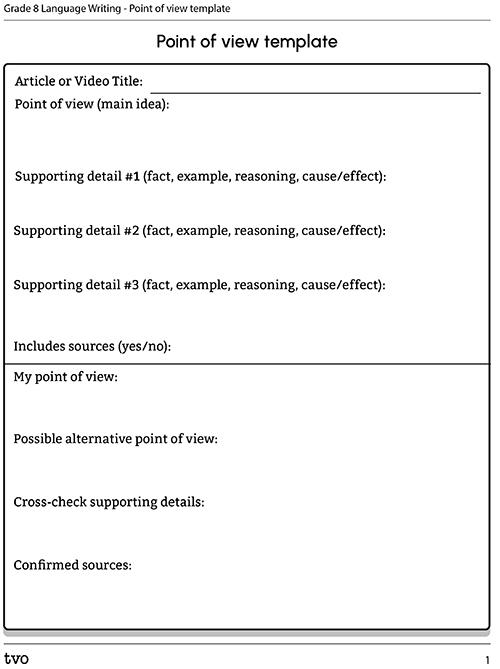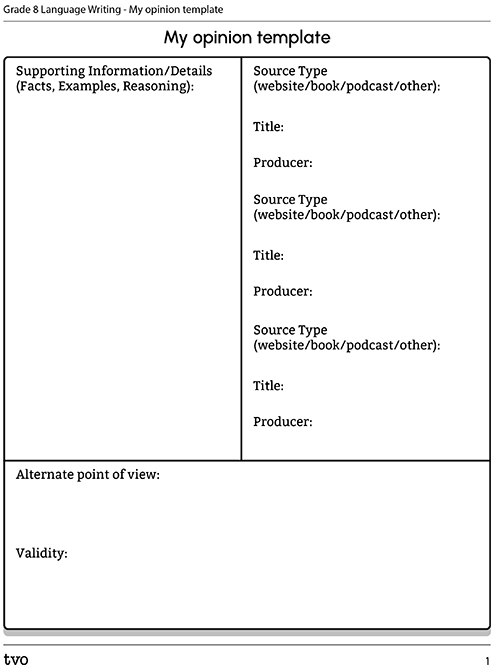Minds On
Opinions and facts

Step 1
Consider what you know about the word "opinion". If possible, discuss this with a partner. Then, using a thesaurus, read out the synonyms for the word "opinion". How many came up in your discussion?

Step 2
Record the synonyms and antonyms in your journal, paper or electronically (voice-to-text or audio-record). Where does this word originate from?

Step 3
Next, find some synonyms and antonyms for the word “fact” (use a thesaurus). Where does this word originate from? Think and write some words that have similar parts or groups of letter blends. What is the difference between an opinion, a fact, and a "fake fact"?
For example, let’s consider these statements about the Toronto Raptors.
Opinion: The Toronto Raptors are the best basketball team in the NBA.
Fact: The Toronto Raptors are a professional basketball team based in Toronto.
Fake fact: Kyle Lowry is retiring this year.


Action
Evaluating opinions
You may remember being taught that opinions must be supported (or explained) using facts. In this learning activity, you will need to support your own opinion with some important and relevant facts and/or examples and reasons to explain why you have or how you formed your opinion(s). Also, you may find that opinions of others are not always based on facts. They may be based on what each person likes, feels, wants or thinks is good or bad. You will have to listen and think critically (carefully) to judge for yourself when someone shares their opinion, whether or not their opinion is supported by enough relevant facts, examples and reasoning.
An opinion is what someone agrees or disagrees with, or thinks is good or bad. Opinions can be agreed with or disagreed with. Opinions can change. Opinions can be argued.
Facts are information that can be proven to be true.
Things such a dates and events can be proven.
Facts cannot be argued. Facts simply are. Facts are things that happened and are true.
We often work with facts like observations, measurements, and proof in subjects like math, science, news reporting, sports, history, geography, and the arts.

Math statements and equations are facts. Three hundred plus three hundred and three equals 603. It is also true that the sides of a square are always equal. That is the definition of a square, not that of a circle. A triangle has three sides; this is always true by definition of a triangle.
There are scientific proofs, theorems and laws of of the Universe. These are scientific facts that have been observed, recorded, researched, proven, confirmed, and accepted in the field of science.
The world needs bees to pollinate flowers so food can grow.
You are a child, not an adult. You are officially considered an adult when you turn 18 years old. These are facts.
The following TVO resource explores the difference between facts and opinions. It is a transcript of a Tumbletown Reads video that focuses on the dangers of sharing opinions as facts in the news.
(music plays)
A hamster reading a book appears in a circle against a blue slate with the caption
"Tumbleweed
Presents."
A blue book with the title Tumbletown Reads appears. A picture of a street in
Tumbletown illustrates
the cover.
The book opens and a picture of a playground appears with the name of today’s tale:
"That’s your
opinion."
[Chattering]
At the playground, Mayor says CAN I GET A WORD IN
EDGE WISE?
Mayor is a white rodent.
Dimitri, a gray bunny, says MISTER MAYOR, WHY BUILD
A BRIDGE OVER TUMBLETOWN LAKE?
Mayor says I REPEAT, WE ARE JUST
STUDYING THE MATTER.
WE HAVEN'T MADE ANY DECISIONS.
A lab rat says YEAH.
Tumbleweed says BUT WE DON'T NEED
A BRIDGE OVER TUMBLETOWN LAKE!
A brown rodent says YEAH, AND SHOULDN'T THE MONEY
BE SPENT ON PROGRAMS FOR THE...
He knocks down a garbage basket.
They all laugh.
A rodent says WHOOPS!
Tumbleweed says HE KNOCKED OVER
THE GARBAGE!
The brown rodent says I DID.
Mayor says EVERYBODY, WE HAVEN'T
MADE A FINAL DECISION ABOUT THE
BRIDGE.
WHEN WE DO, WE'LL LET YOU KNOW,
OKAY?
Tumbleweed says SNEAKING AWAY
INCONSPICUOUSLY.
YOU CAN'T SEE ME.
On a boat, Tumbleweed says WHY DID HE WANT TO BUILD A
BRIDGE?
THAT'S A, THAT'S A CRAZY IDEA.
In his red car, Tumbleweed says I CAN'T BELIEVE THEY'RE EVEN
THINKING ABOUT BUILDING A
BRIDGE.
JUST WAIT TILL I WRITE MY
ARTICLE.
(music plays)
Tumbleweed arrives at the Tumbletown Gazette.
Tumbleweed says AND DONE.
OKAY, PRESS PRINT AND IT'S DONE!
Twiggy reads the newspaper front page and says TUMBLETOWN BRIDGE A BAD IDEA?
WHY IS HE SAYING THAT?
I WOULD LOVE TO SEE A NEW
BRIDGE.
HMM, SAYS HERE THAT THE BRIDGE
WILL BE EXPENSIVE.
Brent, a black and white bunny, says HEY, BUDDY, TO PAY FOR IT,
THE CITY WILL IMPOSE A SEED TAX.
Twiggy says SEED TAX?
BUT I ALREADY PAY 10 SUNFLOWER
SEEDS A YEAR!
Brent says WHEN WILL PEOPLE LEARN THAT
PUBLIC TRANSPORTATION...
Chinchilla comes along and says CHINCHILLA!
Brent says AH!
A white rodent on a boat says BOATS WILL NOT BE ABLE TO
SAIL UNDER IT.
WHAT!?
THIS IS BAD!
WHY DOESN'T ANYBODY ASK THE
CAPTAIN!?
Twiggy says THE BRIDGE MAY EVEN CAUSE
FLOODING IN SOME NEARBY FARMS.
FLOODING?
AT MY FARM?
WELL, OF ALL THE FUR BRAINED
IDEAS!
At the Gazette, Tumbleweed says HEY, CHIEF, CAN
WE MAKE THIS QUICK?
I NEED TO WRITE MORE ANGRY
ARTICLES ABOUT THE BRIDGE.
Chief says LOOK, SLOW DOWN,
TUMBLEWEED.
I NEED TO KNOW WHERE YOU FOUND
YOUR FACTS.
Tumbleweed says FACTS ABOUT WHAT?
Chief says WELL, ABOUT HOW TAXES
WILL GO UP, HOW THE BRIDGE WILL
BLOCK SHIPS AND CAUSE FLOODS.
Tumbleweed says WELL, I JUST
THINK THE BRIDGE IS A BAD IDEA
AND THOSE THINGS COULD HAPPEN.
Chief says TUMBLEWEED, THAT IS
YOUR OPINION, NOT A FACT.
Tumbleweed says A WHATY WHAT NOW?
Chief says YOU THINK THOSE THINGS
MAY HAPPEN BUT YOU CAN'T PROVE
THEY'LL HAPPEN.
IT'S AN OPINION.
Tumbleweed says AND THE PROBLEM
IS?
Chief says OH, AS A JOURNALIST,
YOU NEED TO BACK UP YOUR OPINION
WITH FACTS.
DID THEY DO ANY TESTS TO SEE IF
THERE WOULD BE FLOODING?
ARE THERE EXPERTS WHO AGREE WITH
YOU?
Tumbleweed says WELL, NO BUT I
REALLY THINK THESE THINGS COULD
HAPPEN.
Chief says THEN IT'S AN OPINION.
NOT A FACT.
Tumbleweed says OH, SO I JUST
NEED TO GO FIND SOME PROOF.
OKAY.
Chief says YES, DO THAT, WOULD
YOU?
Tumbleweed says RIGHTY RIGHT,
CHECK, OKAY, SWELL, CHIEF!
He parks by the library and says WHOA!
[Music playing]
Tumbleweed goes over a pile of books and says HMM, IT SEEMS
THAT THERE'S A LOT OF GOOD
REASONS TO BUILD A BRIDGE AND IF
THEY BUILD IT TALL ENOUGH, IT
WON'T BLOCK THE SHIPS AT ALL AND
THERE'S NOTHING HERE ABOUT
FLOODING.
MAYBE I OVER-REACTED.
OH BOY, ANOTHER PRESS
CONFERENCE.
I WONDER IF THERE WILL BE
COOKIES.
OH, AND THE BRIDGE THING TOO.
[Chattering]
At the playground, Mayor says IT SEEMS THAT SOME OF
YOU MAY HAVE GOTTEN THE WRONG
IDEA ABOUT THE BRIDGE.
Tumbleweed laughs and says YEAH, THAT WAS ME.
Mayor says WELL, I'M HAPPY TO
RELEASE THE RESULTS OF OUR
STUDY.
OUR CONCLUSION, WE WILL NOT
BUILD THE BRIDGE.
[Chattering]
Mayor says INSTEAD, I DECIDED TO
BRING YOU THIS.
He uncovers a self-portrait.
All say YAY!
Tumbleweed says UM, OKAY?
Mayor says ISN'T IT BEAUTIFUL?
The lab rat says I LOVE IT.
Mayor says FINALLY SOMETHING THAT
WILL INSPIRE THE PEOPLE OF
TUMBLETOWN.
The lab rat says YAY!
Mayor says MY GIFT TO THE FINE
CITIZENS OF THIS CITY.
LOOK.
Brown rodent knocks down the garbage again.
They all laugh.
Tumbleweed says HE DID IT AGAIN!
[Laughing]
Brown rodent says I KNOCKED IT OVER.
Tumbleweed says OH, BEST PRESS
CONFERENCE EVER.
The book closes and the caption "The end" appears.
The TVO Kids logo appears.
There are relevant and important facts that should be included when supporting an opinion while other irrelevant facts should be left out.
Student Success
Think-Pair-Share
Discuss with a partner or record your answers in a journal, on a paper, electronically and/or as an audio recording. If irrelevant information, and even false information like fake facts are included, what kind of effect would that have on an audience, especially an audience that believes anything and everything they read and see on the new? How often do you think this happens on social media? What do you think you can do to guard yourself from believing potentially incorrect news?
Note to teachers: See your teacher guide for collaboration tools, ideas and suggestions.
Explore one of these TVO resources and identify the point of view and how the point of view is supported using the Point of View Template.

Press tvo today to access "The debate that wasn’t really a debate.".
TVO dot org (Opens in a new tab)Use the Point of View Template in your notebook or use the following fillable and printable document to help document your point of view.
| Article or video |
|---|
|
Title: (Blank) Point of view (main idea): (Blank) (Blank) *supporting detail #1 (fact, example, reasoning, cause/effect) (Blank) (Blank) *supporting detail #2 (fact, example, reasoning, cause/effect) (Blank) (Blank) *supporting detail #3 (fact, example, reasoning, cause/effect) (Blank) (Blank) *include sources (yes/no) (Blank) * Required details My point of view: (Blank) (Blank) Possible alternative point of view: (Blank) (Blank) Cross-check supporting details: (Blank) (Blank) Confirmed sources: (Blank) |
If possible, share your work with 2-3 other classmates to get feedback before conferencing with your teacher. Next research by taking jot notes and examining one of the following topics:
- The history of sports. What is the effect of competition on humanity?
- Computer games. Are computer games addictive?
- Veganism. How does veganism affect your health?
- Waste recycling. What are effective strategies?

You may have another topic that inspires you.
Record your opinion and/or point of view. Include enough relevant supporting details. Record your sources. Use a Cause and Effect table if you think it’s appropriate, and/or a Venn Diagram.
|
Supporting Information/Details: Facts, Examples, Reasoning |
Source Type: website/book/ podcast/other |
|---|---|
|
Title: (Blank) (Blank) Author/Producer: (Blank) |
What opinions and points of view did you come across? Record at least 2-3 different points of view. List any supporting information. Do you think these points of views are valid? Why?
|
Alternate point of view: (Blank) (Blank) Validity: (Blank) |
Use can use the My Opinion Template in your notebook or use the following fillable and printable document to help you get started.
|
Supporting Information/Details: |
Source Type: |
|---|---|
|
Alternate point of view: (Blank) (Blank) Validity: (Blank) |
Title: (Blank) (Blank) Author/Producer: (Blank) |
How could you respond to 1-2 of these alternative points of view? What would you need to do before you can respond?
Consolidation
My point of view
Research a topic that you are passionate about. This could be an environmental or social justice topic, a topic involving science, technology, social media, etc. Be sure to conduct your research by exploring at least three different credible sources of information that contain facts and that you can trust are factually correct. Think of alternative points of view (at least two) and how these alternative points of view might be supported and validated by those holding these alternative points of view.
Submit your work. If you’re having difficulty thinking of at least two alternative points of view, share and discuss your point of view with a partner. Ask them to share their point of view and to explain. Ask them if you can take jot notes of their responses. Think of what you need to research or find out more about and think of how you can respond to at least two of these alternative points of view.
Consider the following images as inspiration. Use the image for inspiration. Are you passionate about the environment? Or perhaps it's animal rights or social justice issues like equality or LGBTQ rights?
Reflection
As you read the following descriptions, select the one that best describes your current understanding of the learning in this activity. Press the corresponding button once you have made your choice.
I feel...
Now, expand on your ideas by recording your thoughts using a voice recorder, speech-to-text, or writing tool.
When you review your notes on this learning activity later, reflect on whether you would select a different description based on your further review of the material in this learning activity.








